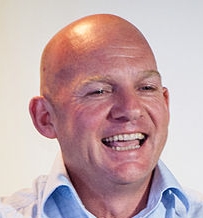 Jamie Whyte, whose has been at various times an academic philosopher (and winner of the Analysis prize for the best paper by a philosopher under 30), a consultant to the banking industry with Oliver Wyman, a foreign currency trader, the leader of New Zealand’s ACT political party, the research director at the Institute for Economic Affairs, the author of several books that every thinking person should read, a frequent contributor to the European edition of the Wall Street Journal and other publications of that ilk, the incoming editor of Standpoint Magazine, an occasional guest poster on this very blog — and the deliverer of one of the most thought-provoking and entertaining lectures I’ve ever heard when he visited Rochester a few years back — will be here again next week, with two events open to the general public. They are:
Jamie Whyte, whose has been at various times an academic philosopher (and winner of the Analysis prize for the best paper by a philosopher under 30), a consultant to the banking industry with Oliver Wyman, a foreign currency trader, the leader of New Zealand’s ACT political party, the research director at the Institute for Economic Affairs, the author of several books that every thinking person should read, a frequent contributor to the European edition of the Wall Street Journal and other publications of that ilk, the incoming editor of Standpoint Magazine, an occasional guest poster on this very blog — and the deliverer of one of the most thought-provoking and entertaining lectures I’ve ever heard when he visited Rochester a few years back — will be here again next week, with two events open to the general public. They are:
Search Results for 'whyte'
 If you’re in the vicinity of the University of Rochester this coming Tuesday (October 4) at 5PM, you are invited to come by Goergen Hall Room 101 to hear Jamie Whyte‘s public lecture on the topic “Regulating Rudeness: The Social Cost of Offensive Speech”.
If you’re in the vicinity of the University of Rochester this coming Tuesday (October 4) at 5PM, you are invited to come by Goergen Hall Room 101 to hear Jamie Whyte‘s public lecture on the topic “Regulating Rudeness: The Social Cost of Offensive Speech”.
Jamie’s talks in the past have been generally dazzling. I expect no less of this one.
 If you like The Big Questions, you really ought to know my brash and brilliant friend Jamie Whyte. After a brief but dazzling career as a philosopher at Cambridge university (he once won the prestigious Analysis prize for the best article by a philosopher under 30), Jamie distinguished himself as a management consultant, a foreign currency trader, and, via his frequent writing, an incisive and steadfast defender of rational thought and individual freedom. His little book on Crimes Against Logic delivers brilliantly on its promise to “expose the bogus arguments of politicians, priests, journalists and other serial offenders”, and his recent collection Free Thoughts (which, true to its title, you can read for free) is essential fare for anyone who cares about clarity of thought — or, because Jamie is as funny as he is brilliant, anyone who’s just looking for a good chuckle.
If you like The Big Questions, you really ought to know my brash and brilliant friend Jamie Whyte. After a brief but dazzling career as a philosopher at Cambridge university (he once won the prestigious Analysis prize for the best article by a philosopher under 30), Jamie distinguished himself as a management consultant, a foreign currency trader, and, via his frequent writing, an incisive and steadfast defender of rational thought and individual freedom. His little book on Crimes Against Logic delivers brilliantly on its promise to “expose the bogus arguments of politicians, priests, journalists and other serial offenders”, and his recent collection Free Thoughts (which, true to its title, you can read for free) is essential fare for anyone who cares about clarity of thought — or, because Jamie is as funny as he is brilliant, anyone who’s just looking for a good chuckle.
Now, in his most startling career twist yet, Jamie has become the leader of a political party in his native New Zealand — the ACT party, named for its forerunner, the Association of Consumers and Taxpayers. ACT stands unabashedly for individual liberty, the rule of law and the enforcement of well-defined property rights. It campaigns against corporate welfare. It’s even pro-immigration. And thanks to New Zealand’s system of proportional representation, it actually gets representatives into parliament.
After several years of turmoil, the party turned to Jamie’s leadership in February of this year. With the boundless energy that inspires awe in everyone he meets, Jamie is re-building the party and promoting a principled free-market agenda in the run-up to the September 20 general election.
 The downside of being a principled politician — and the reason they’re almost vanishingly rare — is that it’s hard to raise funds when you won’t cater to special interests. ACT opposes both corporate welfare and legal favoritism for union members, which cuts out most of the usual big donors. Here’s where you can help, and I hope you will.
The downside of being a principled politician — and the reason they’re almost vanishingly rare — is that it’s hard to raise funds when you won’t cater to special interests. ACT opposes both corporate welfare and legal favoritism for union members, which cuts out most of the usual big donors. Here’s where you can help, and I hope you will.
Never before (and, I expect, never again) have I encouraged my readers to support any political party with their votes, let alone their dollars. That’s because I’ve spent my adult life being seduced and abandoned by politicians who talked a good game and then caved in to expediency when the chips were down. But Jamie — and therefore ACT — is different. I know him as a friend, and I know that principles are his passion.
You can help make ACT’s vision a reality by visiting the donation page and giving generously. Remember that a New Zealand dollar is worth about 88 cents U.S., so if you’re an American, a “$100 donation” is actually $88.
A little more background on New Zealand:
Last week, Britain had a referendum to decide whether or not to replace its current “first past the post” electoral system with the alternative vote system (AV). During the campaign, the No to AV campaign claimed that changing to AV could cost £250 million, in part because voting machines would be introduced with it. Yes campaigner and member of parliament, Simon Hughes claimed that this was false and that the No campaigners knew it was. He asked the electoral commission to stop the No campaigners from lying.
Similar appeals are often made by other frustrated political disputants. But the idea that electioneering politicians should be allowed to say, and voters to hear, only what the electoral commission deems to be true and honestly believed is outrageous. It would make election outcomes depend on the judgement, not of the voters, but of the electoral commissioners.
The proposal is also unnecessary. As anyone who has argued with blowhards will know, there is an easy way of showing that someone does not really believe what he says. Challenge him to a wager. Demand that he put his money where his mouth is.
If the No campaigners really believe that changing to AV would cost £250 million, they will be willing to bet on it. By offering the wager, and having it declined, Mr Hughes would expose their insincerity. Equally, Mr Hughes’ failure to suggest the wager may tell us something about his own alleged certainty on the matter.
Politicians should generally be obliged to bet on the outcomes their various claims. This would discourage their lying which, incredible as it may sound, is even more widespread than people working with the standard definition of lying realise.
 A friend living in England (the philosopher Jamie Whyte, actually, whose writing has graced this very blog) sends along a little vignette for the benefit of my American readers who see European health care systems through rose colored glasses.
A friend living in England (the philosopher Jamie Whyte, actually, whose writing has graced this very blog) sends along a little vignette for the benefit of my American readers who see European health care systems through rose colored glasses.
A 64 year old breast cancer survivor suffering severe back pain is told she’ll have to wait five months for an appointment with an orthopedic surgeon through the National Health Service (NHS). She therefore (and perfectly legally) chooses to pay 250 pounds (about 385 dollars) for a private appointment. He puts her on a waiting list for surgery to remove a cyst from her spine, surgery which is routinely covered by the NHS. But the NHS decides that since she can afford 250 pounds for a private appointment, she can also afford 10,000 pounds (over 15,000 dollars) for private surgery. They therefore deny to provide her the surgery for which she’s been paying taxes her whole life.
This was not an isolated incident; until recently, cancer patients were routinely denied further NHS treatement after privately purchasing lifesaving drugs that are not available through the NHS.
More details here. It’s worth reading the comments, where readers excoriate the patient for “queue jumping” because she used the price system to signal her high demand for medical services. Note that nobody complains about “queue jumping” in the market for, say, oranges, because oranges are not rationed by government bureaucrats and therefore do not generate queues.
The lesson, I think, is that once an inefficient bureaucracy becomes entrenched, a certain fraction of the electorate becomes incapable of imagining anything better. In this case, that fraction seems to have forgotten first that some people need medical care more desperately than others, so that “queue jumping” can be desirable, second that private payments to doctors actually call forth more medical care and therefore shorten queues, and third that maybe it would be better to have a system that didn’t require queuing in the first place.
 In a curiously unmotivated piece at the Washington Post, Anne Lowrey asks: “What if senators represented people by income or race, not by state?”.
In a curiously unmotivated piece at the Washington Post, Anne Lowrey asks: “What if senators represented people by income or race, not by state?”.
I can’t figure out her point. I am all for identifying problems and brainstorming about radical solutions, but I have no idea what problem Lowrey thinks she’s addressing.
The primary problem with representative democracy is that our representatives are captured by special interests. My senators plot to steal from you and your senators plot to steal from me, with a lot of collateral damage along the way. (And yes, you and your neighbors do constitute a special interest, as do I and mine.) The problem is exacerbated by the fact that my neighbors and I have a lot of interests in common, making it easier to steal on all our behalves at the same time. The solution is to make each senator’s constituency more diverse, not, as Lowrey proposes, less.
| —President Barack Obama, January 27, 2010 |
| —President Barack Obama, February 26, 2010 |
| after requesting increased funding for both agencies |
With that out of the way, let me proceed to our traditional weekend roundup. I was extremely pleased this week to have our first guest post from the distinguished philosopher Jamie Whyte. I’ve been a great admirer of Jamie’s writings since I discovered them a few months ago, and I thought his contribution here—on a radical proposal to improve democracy—was fabulous.
We had two other lively discussions this week, one on why Olympians are like Ponzi schemers (with a followup post a few days later) and one on the fiscal stimulus package on the occasion of its one-year anniversary.
Come back Monday for more!
Last year, the British government decided to lift the top rate of income tax from 41 to 52 percent. Last month, Lord Myners, the UK Secretary of State for Financial Services, said that the policy would raise not nearly as much revenue as had been expected. People are apparently making efforts to avoid paying it. A host of politicians and commentators responded that it was always a foolish idea, a purely “political” policy.
But how can a bad policy be good politics? What defect in the electoral system can explain this?
 You know that metal plate in your bathtub? The one with the little lever on it that opens and closes the drain? What happens when the water level rises above that plate?
You know that metal plate in your bathtub? The one with the little lever on it that opens and closes the drain? What happens when the water level rises above that plate?
When my sister asked me this question over Thanksgiving dinner, I answered, with the utmost confidence, that it causes (quite instantaneously) an enormous flood. (Note the exact wording. This will be important later.) My sister nodded sagely and said “That’s what I thought, too.” My sister and I had the same mother, you see.
And then she asked, quite innocently, “So. How exactly does that work?”. And I was stunned—absolutely stunned—to realize not only that I had no answer to this question, but that there could not plausibly be an answer. Which somehow had never occurred to me in the half century or so that I’d been harboring this ridiculous notion.

